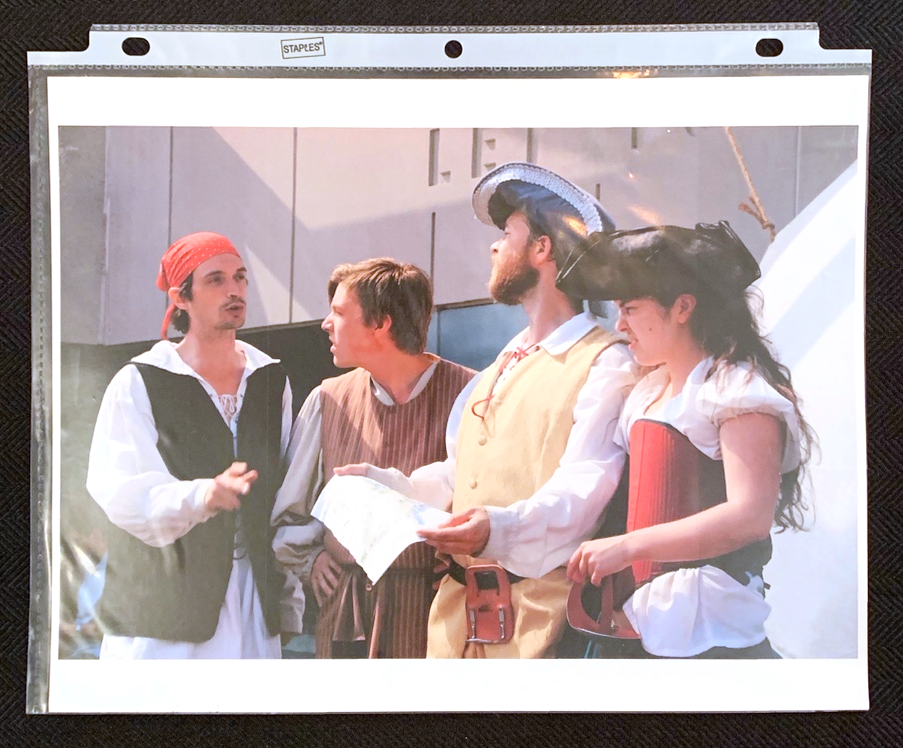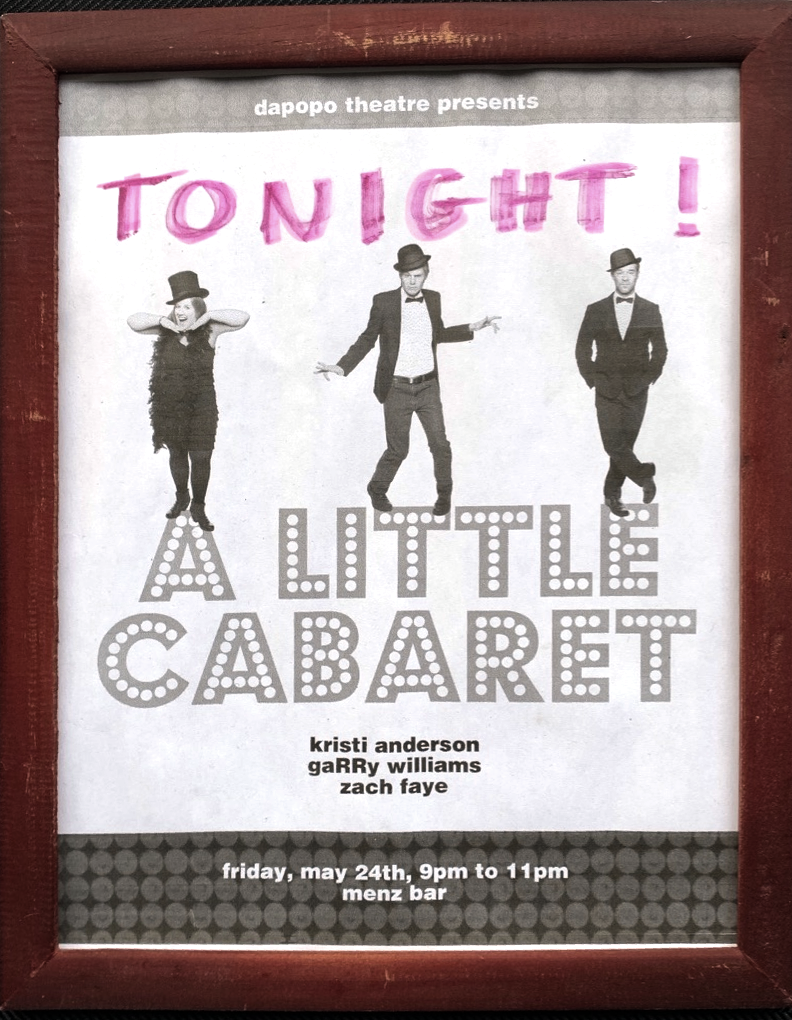DaPoPo, an indie theatre company based in K’jipuktuk/Halifax, was founded in 2004 as the original in-house company of The Bus Stop Theatre. DaPoPo became a staple at Menz & Mollyz with Café DaPoPo and part of the annual Pride line-up, and hosted the annual Live-In Festival from 2008-2018.
Projects DaPoPo has initiated, workshopped, or produced include Four Actors in Search of a Nation; The Sex Play; Apocalypse 2006; Café DaPoPo; The Live-In Festival (LIFe); So… What About Love?; Sunday in the Park With George; A Good Death; The Drinking Game; Jesus Is A Faggot; Making Out With Marx; Tab & Landon; KAMP; The FEAR Project; and, most recently, the Queer Theatre Ensemble/Shakesqeare, and This Is Not Safe.
After sixteen years of performance, art and entertainment, there was a lot of material sitting in boxes in the basement. Claire Yurkovich began organizing it into an archives; here's her journal.
By Claire Yurkovich • 2021-03-22
Among the many surprises that I faced during our dive into the archives of DaPoPo Theatre – Halifax’s ‘daring, political, poetic’ theatre company, the first was the sheer amount of material that greeted me at the door to 1313 Hollis Street: a bright studio space that is home to DaPoPo’s office. It was also the site where our archival work, after countless conversations and big ideas, would blossom and materialize into seven hours spent documenting and photographing material, spanning over 15 years of creative exploration. This seven-hour “archiving bee” was the first step in a project we hope will eventually provide the public with a tangible history of DaPoPo, opening Halifax audiences up to a sense of the longevity of this company, the scope of its impact, and the brilliance of its artistic craft.
I walked into 1313 Hollis as an eager Master’s student, poet, and queer-identifying individual in dire need of some creative energy. It was early November, and as I rushed from my apartment building to Hollis Street on the morning of the 11th, the wind was just brisk enough to let me know that I should retire my fall jacket soon. Picking up my pace, I walked with an intensity that I had not experienced in a while – an excitement that is rare for a Master’s student and even rarer in the current pandemic.
Upon my entrance I felt immediately connected and energized by this project, as I was greeted by GaRRy Williams, DaPoPo Theatre’s co-artistic director, and his partner in art and life, Quincy Russell. I had met Williams a few times prior and was already impressed by his potent energy and candid demeanour. Now, it was a pleasure to be introduced to the remaining board members of DaPoPo Theatre, Russell and Kristi Anderson.
The session officially began with Williams delivering a dramatic reading of a DaPoPo chronology, from 2003-present. This evoked almost all of what DaPoPo encapsulates: each production, review, rejection, workshop, and festival that Williams noted enlarged my understanding of what it means to create art as a vocation. This chronological account was only the beginning. Once it was complete, Williams, Russell, and Anderson started to go through boxes upon boxes of photographs, set lists, programs, posters, and email correspondences. These tangible items – some of which had been kept in pristine condition with plastic covers to avoid smudging, while others carried coffee stains as annotation of many late nights or early mornings – were the raw material of our study. Our task now was to uncover their meaning and relevance.
I took photos while my colleague Luke Hathaway (a wonderful DaPoPo artist, poet, and professor of English at Saint Mary’s University) provided descriptions and transcribed oral histories from Williams, Russell and Anderson. Throughout this process, the collaborators detailed the significance of over 60 items, ranging from posters and zines to a Berlin subway map. The artists’ stories ranged from memories of the company’s performances in Berlin, experiences shared here in Halifax with the wide range of actors, crew-members, photographers, and artists that have worked for and/or supported DaPoPo over the years.
 It was wonderful to simply exist in this creative space – to hear of the ebbs and flows of creative theatre, the triumphs along with the hardships. During his reminiscence about a framed photograph taken in Berlin, Williams mentioned the difficulties that had come with travelling and performing as a small theatre group. The group had once landed in Berlin – tired and jetlagged – only to arrive at a locked gallery space, and later, into a performance space that was nowhere near performance-ready. In Williams’ words, “We found ourselves amid what seemed to be the remnants of a sex party!” Williams recounted this event with a solid sense of frustration but seemed to realize as he drew upon this memory, that it represented just a closing of one door, not a shutdown of the building.
It was wonderful to simply exist in this creative space – to hear of the ebbs and flows of creative theatre, the triumphs along with the hardships. During his reminiscence about a framed photograph taken in Berlin, Williams mentioned the difficulties that had come with travelling and performing as a small theatre group. The group had once landed in Berlin – tired and jetlagged – only to arrive at a locked gallery space, and later, into a performance space that was nowhere near performance-ready. In Williams’ words, “We found ourselves amid what seemed to be the remnants of a sex party!” Williams recounted this event with a solid sense of frustration but seemed to realize as he drew upon this memory, that it represented just a closing of one door, not a shutdown of the building.
The remaining items that Williams and his colleagues shared during those lovely two days demonstrate the intensity of DaPoPo’s art creation. For over 15 years, DaPoPo has worked to provide accessible theatre – which importantly includes the creation of safe spaces in which members of the queer community might find themselves, in connection with local art and culture and with like-minded individuals. This commitment to the celebration and representation of Halifax’s queer community is demonstrated, for instance, by DaPoPo’s creation of new theatre works for Halifax Pride, year after year; we discovered many reminders of these in our archival excavations.
This archival project strongly demonstrates the importance of the work DaPoPo has done for the Halifax arts community – along with providing many individuals like myself with the opportunity to merge into a creative practice. I showed up that brisk November day as a research assistant, but I left seen as a fellow collaborator, friend, and creative – embraced eagerly by the warmth and respect that DaPoPo Theatre whole-heartedly radiates.
Follow DaPoPo on Facebook or Twitter, or visit dapopotheatre.com.

